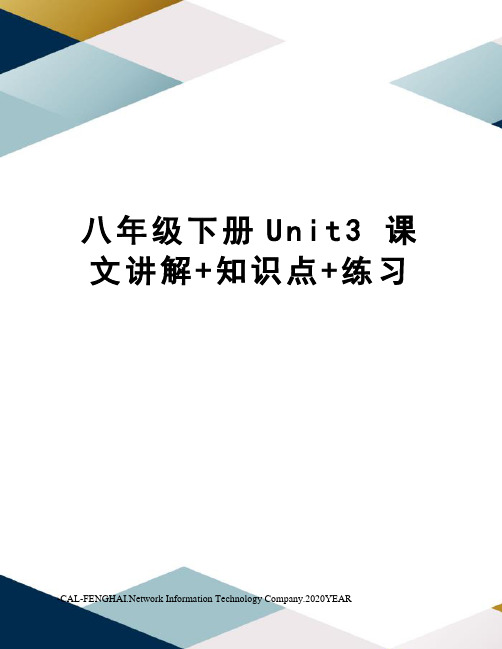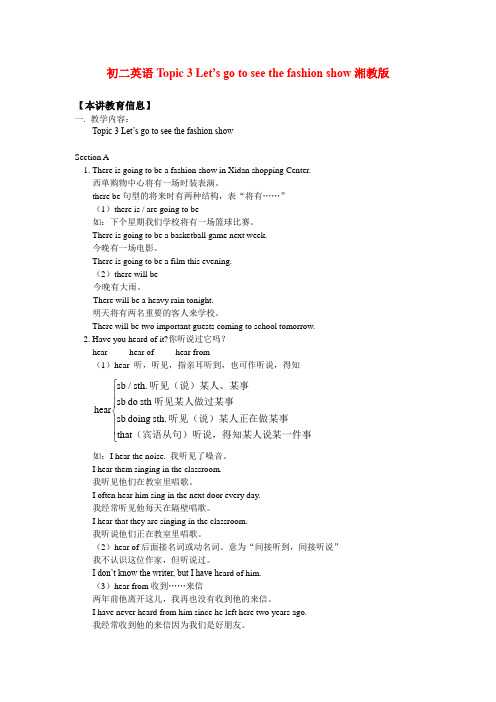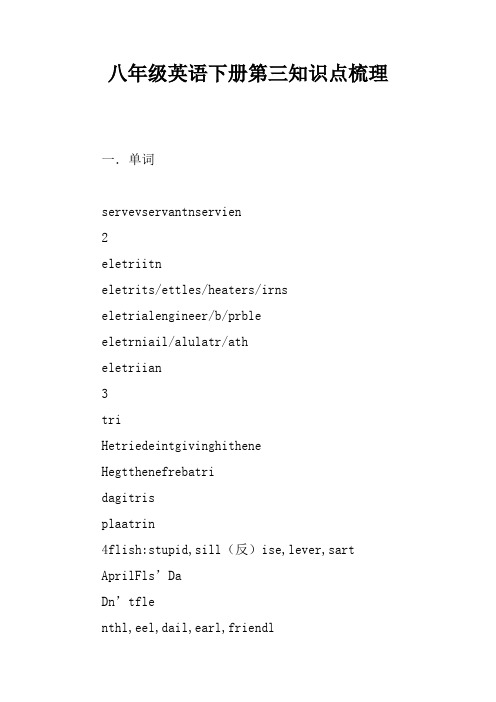初二阳光课程英语第三次课讲义 代词
- 格式:doc
- 大小:92.50 KB
- 文档页数:8


八年级下册U n i t3课文讲解+知识点+练习work Information Technology Company.2020YEARUnit3 Could you please clean your room?Section A重点短语go out for dinner 出去吃饭stay out late 在外面待到很晚go to the movies 去看电影get a ride 搭车work on 从事finish doing sth. 完成做某事clean and tidy 干净整洁do the dishes 洗餐具take out the rubbish 倒垃圾fold your/the clothes 叠衣服sweep the floor 扫地make your/the bed 整理床铺clean the living room 打扫客厅no problem 没问题welcome sb. 欢迎某人come home fro m school/ work放学/下班回家throw down 扔下sit down 坐下come over 过来take sb. for a walk 带某人去散步all the time 一直;总是all day/evening 整曰/夜do housework 做家务shout back 大声回应walk away 走开.share the housework 分担家务a comfortable home 一个舒适的家in surprise 惊讶地get something to drink 拿点喝的东西watch one show 观看一个节目hang out 闲逛pass sb. sth. 把某物传给某人lend sb. sth. 把某物借给某人get sth. wet 使某物弄湿hate to do sth. 讨厌做某事do chores 做杂务help sb. (to ) d o /with sth 帮助某人干某事bring a tent带顶帐篷来buy some snacks买些小吃go to the store去商店invite sb. to a party邀请某人参加聚会make sb. do sth. 使某人做某事enough stress足够的压力waste of time浪费时间in order to为了get good grades取得好成绩mind doing sth. 介意做某事depend on依赖;依靠develop children’s independence发展孩子的独立性look after/take care of 照顾;照看do one’s part in (doing ) sth.做某人分内的事二、重点句型1. Could you please…..do sth.Could you please clean your room你能整理一下你的房间吗2. I have to do some work.我必须干些活。

Unit 3 Section A目标导航单词outgoing adj.爱交际的;友好的;外向的fantastic adj.极好的;了不起的better adj.& adv.(good和well的比较级)较好的(地);更好的(地)both adj.&pron.两个;两个都which pron.&adj.哪一个;哪一些loudly adv.喧闹地;大声地;响亮地clearly adv.清楚地;清晰地;明白地quietly adv.轻声地;轻柔地;安静地win v.获胜;赢;赢得hardworking adj.工作努力的;辛勤的though adv.不过;可是;然而conj.虽然;尽管;不过petition n. 比赛;竞赛;竞争短语both...and......···和······都have fun 玩得愉快singing petition 歌唱比赛care about 关心;在意play the drums 打鼓用法归纳3.as+形容词或副词的原级+as与······一样······句子 1. And she also sings more loudly than Tara.并且她也比塔拉唱得更大声。
2.Oh,which one was Lisa?哦,哪一个是莉萨?3. Are you as friendly as your sister?你和你妹妹一样友好吗?知识精讲知识点01 outgoing adj.爱交际的;友好的;外向的教材原句I'm more outgoing than my sister.用法outgoing 用来描述人的性格,可作表语或定语,其比较级是more outgoing.She is an outgoing girl and she likes outdoor activities.她是个外向的女孩,而且她喜欢户外活动。

语法精讲过去进行时闯三关第一关:用法关过去进行时表示在过去某个时刻正在进行或某段时间内持续进行的动作。
其结构为“was/were+现在分词”。
如:I was watching TV at home at this time yesterday.昨天这时候,我正在家里看电视。
第二关:句型关肯定句:主语十was/were十现在分词+其他.否定句:主语+ was/were+not+现在分词+其他.一般疑问句:Was/Were+主语十现在分词+其他?特殊疑问句:特殊疑问词十was/were +主语+现在分词+其他?第三关:时间状语关过去进行时常和at3 o'clock yesterday afternoon, in those days, at this time yesterday 等时间状语以及when或while引导的时间状语从句连用。
表示两个过去的动作同时发生,通常由while 引导;表示当一个动作发生时,另一个动作正在进行,常用when 引导。
[教材典句]1.暴风雨到来的时候你正在做什么?(P17)What were you doing when the rainstorm came?2.当你打时,我正在洗澡。
(P18)When you called, I was taking a shower.3.当琳达睡觉时,詹妮正在帮助玛丽做家庭作业。
(P20)While Linda was sleeping, Jenny was helping一、用所给单词的适当形式填空。
1.一How did you fall in love with my dad,Mom?He (make)a speech when I first saw him. He was so handsome and got a very attractive voice, you know, back then. _ (draw) on the beach from 7 to 9 o'clock yesterday morning.3.My mother _(not walk) with me at this time yesterday.4. Lucy was (dance)while her sister was (sing) at 6:00 p.m. yesterday.5. I didn't know the car (e) while he was shouting.二、单项选择。

初二英语Topic 3 L et’s go to see the fashion show 湘教版【本讲教育信息】一. 教学内容:Topic 3 Let’s go to see the fashion showSection A1. There is going to be a fashion show in Xidan shopping Center.西单购物中心将有一场时装表演。
there be 句型的将来时有两种结构,表“将有……”(1)there is / are going to be如:下个星期我们学校将有一场篮球比赛。
There is going to be a basketball game next week.今晚有一场电影。
There is going to be a film this evening.(2)there will be今晚有大雨。
There will be a heavy rain tonight.明天将有两名重要的客人来学校。
There will be two important guests coming to school tomorrow.2. Have you heard of it?你听说过它吗?hear hear of hear from(1)hear 听,听见,指亲耳听到,也可作听说,得知h e a r sb sth sb do sth sb doing sth that /..听见(说)某人、某事听见某人做过某事听见(说)某人正在做某事(宾语从句)听说,得知某人说某一件事⎧⎨⎪⎪⎩⎪⎪如:I hear the noise. 我听见了噪音。
I hear them singing in the classroom.我听见他们在教室里唱歌。
I often hear him sing in the next door every day.我经常听见他每天在隔壁唱歌。

八年级英语下册第三知识点梳理一.单词servevservantnservien2eletriitneletrits/ettles/heaters/irns eletrialengineer/b/prbleeletrniail/alulatr/atheletriian3triHetriedeintgivinghitheneHegtthenefrebatridagitrisplaatrin4flish:stupid,sill(反)ise,lever,sart AprilFls’DaDn’tflenthl,eel,dail,earl,friendl6inaa,inseas,inthesaea,indifferentas,inanthera,bthea,inthea,nat,inthisa,inanas7explainvexplanatinn8arevnareful,arelessarelessnesssadnessbearefulith9visinnvisibleadthatanbeseenlearlinvisible:thatanntbeseen组成反义词unhapp,unable,unind,unfrtable,inrret,ipssible,ipati ent,iplite,irregular,unneessar,dishnest,dislie,disa gree,disappear0bur:put…inthegrundrputunderThegreatanasburiedherefrever(buried)1pliteplitelplitenessipliteruderudel2grin:abigsilenthefaeHehadabradgrinnhisfae Hegrinnedate3ntain:havesethinginsideraspartfit ntainer容器ntain里面确实有hld可容纳指大小TheglassntainsaterThehuseanhld20peple4lear:eastsee,hearrunderstandlearlIanttbequitelearnthisprblelvlern6uragenenuragevenurageentn7behavevbehavirn8ustuster二.文apaetfbar,slie,artn,bunh2atlast,finall,intheend 3even Evenahildanunderstandit unevenlessabutit Evennuber4inpaets/bags以。
Everything comes to him who waits. There is no royal road to learning.——功夫不负有心人----书山有路勤为径,学海无涯苦作舟。
第三讲Mr. Brown has five sons. They are Ted, Tom , Bob, Jack, John. John has no elder brotherand he was four years old when his first younger brother was born. Tom is very lucky. Thenumber of his elder brothers is the same as his younger brothers. Jack will be 21 next year, andhe is five years older than Bob. Bob is two years younger than Tom. Ted has no younger brother.There is 12 years between him and John.How old are Mr. brown's sons?Part 1 SpeakingKey word and phrases:Tony: What are you doing for vacation, Lin Hua?Lin Hua: I’m going to Tibet for a week.Tony: That sounds interesting! What are you doing there?Li Hua:I’m going hiking in the mountains. How about you, Tony? What you doing forvacation?Tony: I’m visiting my friend in Hong Kong.Li Hua: Oh yeah? How long are you staying?Tony: Just about four days. I don’t like going away for too long.Li Hua:Well, have a good time! Send me a postcard from Hong Kong!Tony: Sure. Show me your photos when you get back to school.1. go +动词-inge. g. go hiking, go fishing, go boating, go climbing.2.–That sounds nice. -He looks very happy.-The silk feels smooth. -The soup taste delicious.-The flower smells sweet.a week. John plans to have a relaxing time. He’s taking some books because he wants to read.He’s going hiking and bike riding. John is going to the mountains on Monday and coming homeon Friday. He’s going to a party on Saturday night.John’s mother is going on Monday, too. She’s staying all week and coming home on Sunday.She plans to take walks with her husband in the beautiful countryside.John’s father is working Monday and Tuesday, so he can’t be in the mountains then. He’sgoing on Wednesday morning. He plans to go fishing, and he’s coming home with John’s mother.John’1.I’m spending time in the beautiful countryside.a). spend time doing something.Much of our time is spending doing exercises.b). spend money on something.She spend much money on clothes last month.Grammar : 现在进行时现在进行时的结构构成:由be+动词+ing, 基本用法:☆表示现在(指说话人说话时)正在发生的事情, 常与now, at present等时间状语连用。
一、短语背诵大全bring out拿出;推出the same as与...同样的in fact事实上;实际上;确切地说be similar to类似于;与...相似look the same=look like 看起来像as long as只要in some ways在某些方面as you can see 正如你能看到的look different 看起来不同in common 共同的not as/so…as… …不如…more than=over 多于,超过do well in doing sth. 擅长做某事do well in sth 在….方面好be good at doing sth 擅长做某事be good at sth 在….方面好make sb. +do sth使某人做某事…have good grades 成绩优良be good with sb. 善于与某人相处call…at +电话号码拨…找…stop doing sth. 停止做某事stop to do sth. 停下来做某事begin with..以…开始most of……中的大多数primary school 小学both…and… 两者都laugh at…嘲笑…my twin sister 我的双胞胎姐姐enjoy doing sth.“喜欢做某事”;enjoy oneself = have a good time more than(=over)“超过,比……多”,反义词是less than“不足,少于”be different from…“与……不同”wait for 等待、等候have fun doing sth. 享受做某事的乐趣want to do sth. 想要做某事= would like to do sth 愿意去干某事as + 形容词或副词的原级+ as 与…一样…It’s+ 形容词+ for sb. to do sth.. 对某人来说,做某事是……的。
UNIT3 TOPIC1基础知识巩固Section A1.What do you often do in your free time ? 你在空闲时间里经常做什么?in one’s free time = in one’s spare time 在某人空闲时间里I play basketball in my free time. 我在空闲时间里打篮球。
2. why not go out and do some outdoor activities ?(1)表建议的句型有:Why not = Why don’t you,后接动词原形,如:Why not/ Why don’t you go out ? What about = How about 后接动词ing,如:What / How about going out ? Shall we + 动词原形,如:Shall we go out ?Let’s ...如:Let’s go home.You ‘d better(not)...如:You ‘d better give up smoking.You should ...如:You should go home now.(2) do some outdoor activities 做户外活动3. Maybe I need a change.change ①名词,改变,如:a great change。
②动词,改变,如:He changed his mind.改变主意:change one’s mind 换衣服:change one’s clothes③名词,零钱,如:Here’s you r change.4.I am interested in playing basketball. 我对打篮球感兴趣。
be interested in =become interested in 对……感兴趣He is interested in fishing. 他对钓鱼感兴趣。
初二阳光课程英语第三次课讲义代词一、基本要求1.人称代词、物主代词的用法;2.指示代词及单复数;3.不定代词的用法;4.反身代词的人称和数的变化;二、能力要求在正确运用各种代词的基础上、重点掌握物主代词、不定代词和反身代词,并能够在题干所提示的语境和逻辑关系中灵活运用。
三、分类* 人称代词* 物主代词* 指示代词* 反身代词例题:1. I can't repair the model ship ____. Can you help ?A .me; me B. myself ; myself C .myself ; me D. me ; myself2. Does your brother often wash clothes ?A. he B .himself C. herself D .him3. The book on the shelf is _____. She wrote name on its cover .A .Hers; her; herself B. Her; hers; herselfC. Herself; her; hers D .Her; herself; herself4. Is this her bike? No, it isn't. It's ____.A. mineB. myC. meD. he's5. ____ Li Ping's brother.A. HerB. HisC. He'sD. She's6.When you see Tom and his sister , tell that mother is waiting at the gate.A. his ; hisB. her; hersC. them ; theirD. his ; her* 不定代词(一)some , any, no, all,nonesome意为“一些”、“若干”,具有名词和形容词的作用。
some 作定语时,可修饰可数名词和不可数名词。
some 通常出现在下列场合:1. 肯定句;2. 含请求和邀请意义的疑问句;3. 表示劝告或建议的肯定句。
例如:(1) Some are playing basketball. The others are playing football.(2) Would you like some coffee?(3) Won't you have some more money?any在句中作定语时,可修饰可数名词或不可数名词。
1. 用于否定句、疑问句或条件状语从句时,表示“一些”;2. 用于肯定句时,表示“任何的”、“任何一个的”。
例如:(1) I have some English books,but I haven't any books that you need.(2) Do you have any tickets?(3) The teacher asked us if we had any questions.(4) You can come at any time.no意为“没有”,作定语用,修饰单数可数名词时,在意义上相当于not a ;no 作定语用,修饰复数可数名词或不可数名词时,在意义上相当于not any .例如:(1) No news is good news.(2) There are no students in the classroom now.all表示“一切”、“全部”、“全体”的意思,可以代替或修饰两个以上的人或物,也可以代替或修饰不可数名词。
all 指人并单独在句中作主语时,谓语动词为复数形式;all 指物并单独在句中作主语时,谓语动词为单数形式。
使用all 时,应注意:1. all 后面可以跟of 短语。
若of 后面的宾语是名词,则of 可以省略;若of 后面的宾语是人称代词,则of 不可省略。
2. all 作定语修饰名词时,应该按照“ all+ 定冠词/ 指示代词/ 物主代词+名词”的顺序排列。
3. all 和否定词not 连用,表示“部分否定”,意为“并不是所有的”。
例句:(1)All are here. Let's begin our class.(2)That's all for today.(3)All (of )the visitors are from America .(4)All of us will go shopping tomorrow.none意为“没有任何东西(人)”、“……中任何一个都不”。
none 可以指人,也可以指物;none 作主语时,要与of 短语连用,若代替可数名词,谓语动词可为单数形式,也可为复数形式,若代替不可数名词,谓语动词应为单数形式。
例如:(1)None of us like go swimming.(2) None of the money is yours.(3) I know none of his friends.(二)other, another,oneother表示“另外的(人或物)”、“其他的(人或物)”。
如果意思上需要,可用复数形式others .注意:1. 表示某些人/ 物中的“一些……另一些……”,应该用some … others…;2. 表示两者中的“一个……另一个……”,应该用one … the other…;3. 拿一群中的某一个和这一群体中的其他个体相比较时,应在名词前加other ;4. other 与表示数量的词连用时,必须放在数量词之后,表示在原有数量上又增加了多少。
例如:(1) Some will visit the Great Wall,others will visit the Summer Palace.(2) I have two brothers. One is a doctor,the other is a professor.(3) Can you finish your homework without others' help?(4) He studied harder than any other student in his class.(5) You'd better stay in the hotel for five other days.another表示“(三个以上不定数目中的)另一个”。
1. another 表示“另一个”、“再一个”时,一般只能用于代替或修饰单数可数名词;2. another 表示“外加……一个”、“再来……一个”时,通常位于“基数词或few + 复数名词”之前。
例如:(1) Would you like another cup of tea?(2) I don't like this apple. Please give me another.(3) They asked us to stay for another few days.(4) I ate an apple, I want Another two (apples).one 用来泛指任何人时,其所有格形式为one's ,反身代词为oneself ;one 也可用来代替上下文中出现过的可数名词,复数形式为ones ,这时它的前后都可用其他限定词语加以修饰。
it指代同一事物,that代替不可数名词。
例如:(1) One should be strict with oneself.(2) Something is wrong with one of the machines.(3) This apple is too small. Please give me a big one.(4) This park is more beautiful than that one.(5) The population of China is larger than that of Japan. (下学期重点讲解)(三)many / much few /a few little /a littlemany / much除可用在肯定句中作主语或修饰主语外,还可用在否定句和疑问句中。
例如:(1)Many of the boys in our class like music.(2)Much has been done to stop pollution.(3)There isn't much food left,is there?few 与a few 修饰可数名词;little 与a little 修饰不可数名词;few 与little含否定意义;a few 与a little含肯定意义。
例如:(1) His lecture is very difficult, but a few people can understand it.(2) His lecture is very difficult, and few people can understand it.(3) There is still a little water in the bottle.(4) There is little water in the bottle. Please go and get some.(三)both与neither,either,eachboth意为“两者都”,与not 连用时表示“并非两者都……”,为部分否定。
both 在句中作主语时,谓语动词为复数形式。
例如:(1) Both of the stories are interesting.(2) There are trees and flowers on both sides of the street.neither意为“两者都不”,作主语时,谓语动词应为单数形式。
例如:(1)-Do you like apples or pears?-No,I like neither of them.(2) Neither of the boys is my son.(3) He gave me two apples but neither of them is sweet.either意为“两者中的任何一个”,作主语时,谓语动词应为单数形式。
either … or …意为“要么……要么……”。
例如:(1) You can eat either of the apples,but you can't eat them both.(2)-Do you want an apple or a pear?-Either will do.(3) There are many new buildings on either side of the streets.each 指两个或两个以上的人或物中的一个,侧重于个体;every则更强调全体或全部。